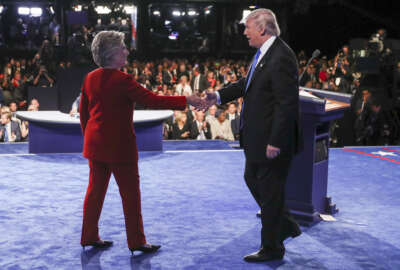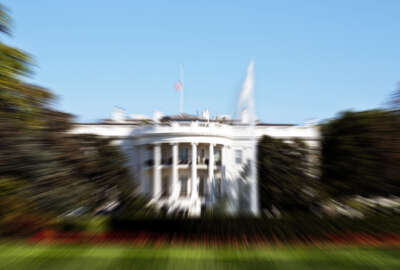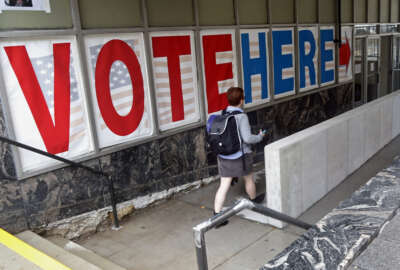
Election Day 2016: What to watch for and remember as a federal employee
Election Day can be a whirlwind of campaign signs, crowded polling sites and an avalanche of social media posts. To help cut through the chaos, here's Federal News...
Federal News Radio recognizes the weight any election — much less a presidential one — can have on federal employees, and the policies and programs of the government.
With that in mind, here’s an update to our look at what the election of Hillary Clinton or Donald Trump would mean for the government workforce, as well as a list of some congressional races in fed-heavy states, and a quick reminder about Hatch Act do’s and don’ts.
A hiring freeze and breaking gridlock
In late October, Trump unveiled his plan for his first 100 days in office, which includes “a hiring freeze on all federal employees to reduce federal workforce through attrition.”
The plan does not apply to military, public safety and public health workers.
Clinton said in her 100-day jobs plan, released earlier this summer, that she would “break through Washington gridlock to make the biggest investment in good-paying jobs since World War II,” but doesn’t directly address federal employees.
In a response to a National Active and Retired Federal Employees Association (NARFE) questionnaire, Clinton said she would “oppose arbitrary, across-the-board pay freezes, retirement cuts, or cuts to other employee benefits.”
Congressional showdowns
Federal employees stream into Washington every day, but a majority of the government workforce resides outside the Capital Beltway. Here are the some of the congressional races to watch across the country — and the ones in the D.C. area.
Alabama
- Senate
- Sen. Johnny Isakson — (R) incumbent, Committee on Veterans’ Affairs, Select Committee on Ethics, Committee on Finance
- Jim Barksdale — (D)
- Allen Buckley — (L)
Arizona
- Senate
- Sen. John McCain — (R), incumbent, Committee on Armed Services, Committee on Homeland Security and Governmental Affairs
- Ann Kirkpatrick — (D)
- Gary Swing — (GRN)
Illinois
- Senate
- Sen. Mark Kirk — (R) incumbent; Committee on Appropriation
- Rep. Tammy Duckworth — (D) currently serving in House, Committee on Oversight and Government Reform, Committee on Armed Services
Maryland
- Senate (replacing Sen. Barbara Mikulski (D))
- Rep. Chris Van Hollen — (D), currently serving House; Budget Committee
- Kathy Szeliga — (R)
Texas
- House of Representatives
- 13th District
- Rep. Mac Thornberry — (R) incumbent, Armed Services Committee
- Calvin DeWeese — (L)
- Rusty Tomlinson — (GRN)
- 23rd District
- Rep. Will Hurd — (R) incumbent, Committee on Oversight and Government Reform, Committee on Homeland Security
- Pete Gallego — (D)
- Ruben S. Corvalan — (L)
- 13th District
Virginia
- House of Representatives
- 2nd District (includes Naval Station Norfolk)
- Scott Taylor — (R)
- Shaun Brown — (D)
- 8th District (includes Northern Virginia)
- Rep. Don Beyer — (D) incumbent, Committee on Science, Space, and Technology
- Charles Hernick — (R)
- Julio Gracia — (I)
- 10th District (includes Northern Virginia)
- Rep. Barbara Jean Comstock — (R) incumbent, Committee on Transportation & Infrastructure, Committee on Science, Space, and Technology
- LuAnn L. Bennett — (D)
- 11th District (includes Northern Virginia
- Rep. Gerry Connolly — (D) incumbent unopposed; Committee on Foreign Affairs, Committee on Oversight and Government Reform
- 2nd District (includes Naval Station Norfolk)
Washington, D.C.
- Non-voting delegate to the U.S. House of Representatives
- Eleanor Holmes Norton — (D), incumbent
- Natale (Lino) Stracuzzi — D.C. Statehood Green Party
- Martin Moulton — (L)
Wisconsin
- Senate
- Sen. Ron Johnson — (R) incumbent; Committee on Homeland Security and Governmental Affairs, Committee on the Budget
- Russ Feingold — (D)
Excused absences for voting feds
Federal employees are getting a hall pass on Election Day. In an Oct. 18 Office of Personnel Management memo, acting Director Beth Cobert instructed agencies to offer excused absences if necessary to allow feds to get to their polling centers.
According to the memo, an absence can be granted if the polling place is not open at least three hours before or after an employee’s regular work hours — “whichever requires the lesser amount of time off.”
“If an employee’s voting place is beyond normal commuting distance and vote by absentee ballot is not permitted, the agency may grant excused absence (not to exceed 1 day) to allow the employee to make the trip to the voting place to cast a ballot,” the memo states. “If more than 1 day is needed, the employee may request annual leave or leave without pay for the additional period of absence.”
Hatch Act heads up
While there are only hours left to campaign for a candidate or cause, OPM is urging federal employees to remember Hatch Act rules. A majority of federal employees must follow five provisions:
- Federal employees are prohibited from using their official authority to interfere with the results of an election.
- Federal employees may not solicit, accept or receive political contributions.
- Federal employees are prohibited from being candidates in partisan elections.
- Federal employees may not encourage or discourage the political activity of anyone with business before their employing agency.
- Federal employees are prohibited from engaging in political activity on-duty or in the federal workplace, while wearing an official uniform or insignia, or using a government vehicle.
Off the clock, out of uniform and away from the office, most federal employees enjoy the freedom of the general public to support whomever they want. Some employees, like those in law enforcement or members of the intelligence community, have additional restrictions.
And if you want to post a picture of yourself in a voting booth, or declare your support of a candidate on your Twitter feed or Facebook account, consult the Office of Special Counsel’s social media guide.
OSC advises that federal employees can post campaign logos or photographs on their personal accounts, but “because a profile picture accompanies most actions on social media, employees would not be permitted, while on duty or in the workplace, to post, ‘share,’ ‘tweet,’ or ‘retweet’ any items on Facebook or Twitter, since each such action would show their support for a partisan group or candidate in a partisan race, even if the content of the action is not about those entities.”
Copyright © 2025 Federal News Network. All rights reserved. This website is not intended for users located within the European Economic Area.





